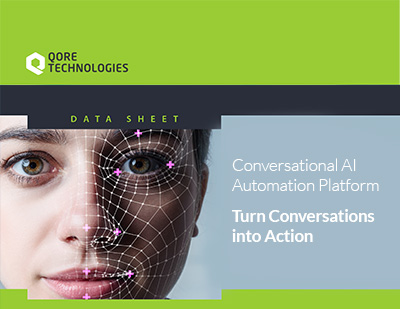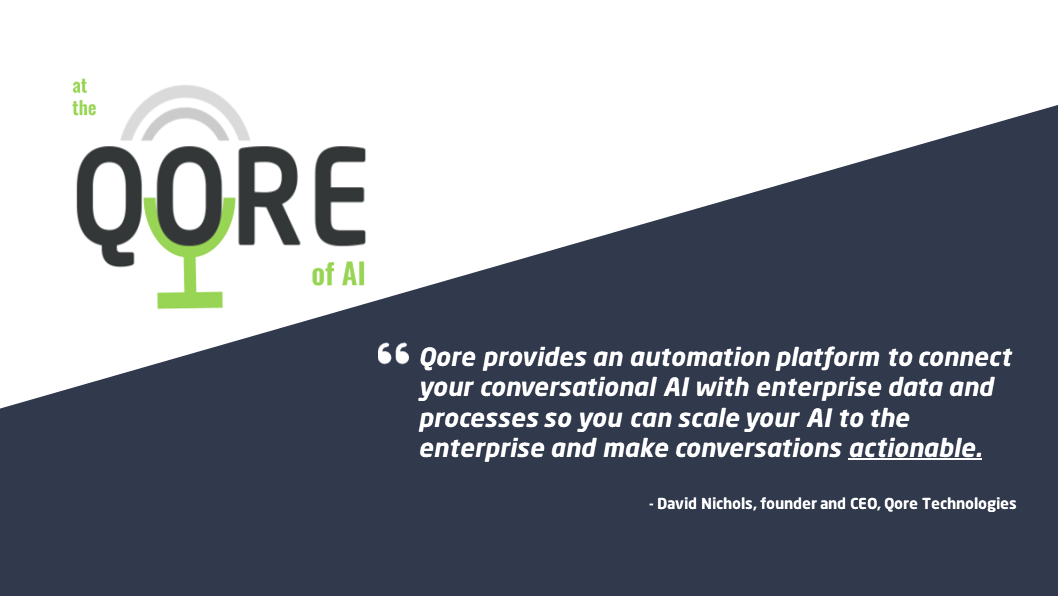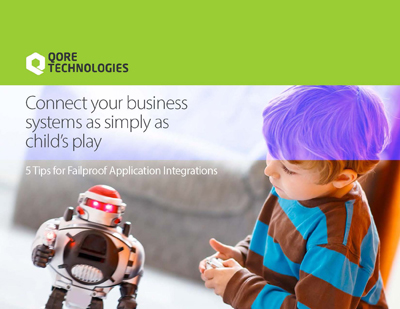Podcast host Greg Vitarelli | Podcast guest David Nichols
May 20, 2022 | 11 min 38 sec
In this episode, David shares his journey in computing from self-taught programming on his parent’s Apple II to the impact university-level philosophy has had on his view of ethical AI.
Podcast TranscriptWelcome to At the Qore of AI, a podcast series focused on the challenges of scaling AI in the enterprise. In this episode we’re joined by David Nichols, the founder, and CEO of Qore Technologies.
Welcome, David, thank you for joining us.
Hey, thanks, Greg. It’s a pleasure to be here.
In our previous discussions, you shared some of the key trends which you are particularly mindful of, specifically conversational AI, and ethical AI, and I’m eager to get into these areas with you. But before doing so, I thought we would go back in time and get a sense of what led you to this point.
When I speak to people who have had a career that touches areas like telecommunication systems, IT development and operations, architecture, and design, this is a sign that you have had early influences to computing.
I’m always curious to ask people who I consider, peers in that respect what their first computing experiences were.
Yeah, absolutely. It seems like it wasn’t that long ago, but it was. It was back in the late eighties, mid-eighties, actually, with the Apple II plus computer. So, I taught myself BASIC and then 6502 assembly language. And in fact, it’s kind of funny, we’re talking about AI now, but back in the eighties, what I was trying to do in a very amateurish way was to make programs that would be able to communicate with people in a natural way. So natural language was always a hobby of mine. It is something that’s interested me for a very long.
And I assume that this would eventually lead you to study computer science, which you did at Texas A&M. I also notice that you received a distinguished student award from the college of engineering, What was that about?
Yeah, it did lead me to that. I did choose computer science mostly because I didn’t know what else to do and that was good at it. The distinguished student in the ward I actually got because I was very good at programming and I had a professor that I was working with very closely.
And I did some projects for him that he thought were exceptionally good. We had a very good relationship, so pretty sure it was Professor Dougherty, one of the main computer science professors at A&M at the time.
So, in addition to computer science, you also studied philosophy which seems to have had a lasting impact. Can you recall areas, within this course of study, that are still resonating with you?
The philosophy that I studied was actually a smaller part of classical philosophy, that defined European philosophical thought, like Nietzsche or Søren Kierkegaard, and other big thinkers but in fact, the majority of that was about the theory of number systems and logical systems and things like that. Even neural networks and things – it was really a lot of AI stuff. For sure all that had a heavy influence on me and still does, today.
Just to set some context for our audience you graduated in 93; it was a period of deregulation of the telco industry and there were long-haul players like MCI and Sprint who were investing heavily in cellular and wireless technology.
And this led you to do a stint with AT&T but soon after you came to work and reside in Europe, where you remain today. Bring us back to those post-grad years.
Well, I was not really looking to be in telco, but telco found me. Like you said, there was a lot of activity there. I ended up working for AT&T but then, shortly after that,I ended up doing the first private teleco launch in Austria, which was UTA Telekom.
So you go to work for EDS. Now, most in our audience who don’t remember EDS surely remember its CEO, Ross Perot, who made a newsworthy, but unsuccessful bid for a president of the United States.
After EDS, you went on to roles at Cap Gemini, and then at Hutchinson 3G, which is now 3. But then in 2006, you founded Qore Technologies.
Can you take us back to that process and what led you to found your own company?
When I ended up working for Hutchison, I delivered the billing functionality, mediation system and things like that. The problem was that the integration solution that was delivered didn’t work properly, unfortunately. And it was killing them.
So, they had a project, they call it the Thousand a Day project. They had over 20 developers working on the official solution but couldn’t even activate a hundred customers a day.
It was extremely complicated…so I told my boss (that) I can make the work around for you and I can get this live quickly. I asked them if they don’t mind if I use my own programming language to do it.
And that’s a crazy approach. I realize that but he gave the okay. So I did do that.
Wow. In terms of founder stories that is really unique.
Well, I literally saw this large team of competent engineers struggling because of the wrong approach.
So I was thinking, how can I deliver something with a far simpler technical foundation. That is designed for optimal productivity. And so what I wanted to do was take a language like Perl, which is a scripting line and provide the advantages of a language like Java, as far as how it’s suited to enterprise development with strong typing and object-oriented features.
So I delivered a language, called Qore, which is like an enterprise version of Perl. But now it’s more like an interpreted version of Java.
So David, tell me more about Qore Technologies.
Qore provides an automation platform to connect your conversational AI with enterprise data and processes. So you can scale your AI to the enterprise and make conversations actionable.
And that last part is actually the most important because we are a platform that enables very complex IT connectivity and automation to be developed. But what we want to do is actually empower our customers to do that.
What we want to be is like the Intel Inside for conversational AI; the rocket engine and allows you to take your conversational AI and actually shoot it out into space…go somewhere (you know) scale it, make it actionable for a real enterprise customer instead of a small mom and pop shop.
And this is all enabled because we have a low-code no-code solution. So it enables non-experts to do expert level things and it allows experts to do things much faster at a much lower risk – so much faster time to market. It’s a win-win, especially because our platform is not just low-code no-code; it does allow these reusable objects to be created by our users.
Today, You’re talking about hot topic issues in the field of AI. Speak to me about conversational AI. And why do think this is trending?
Conversational AI is another way to provide value from automation.
If you’re a company that’s looking to embrace digital transformation, you’re going to look at automating your processes to improve your customer experience, to reduce your costs, and to provide business scalability. So, conversational AI is a great way to do that.
The challenge is how do you make a solution that provides a natural, conversation with a customer? So the machine understands what you want and gives you what you want.
The other challenge is then how do you actually access data within your enterprise environment?
Let’s say you want to automate your process across a bunch of backend systems. This is an entirely different challenge and where Qore Technologies can come in because we have a very interesting approach where we very tightly integrate enterprise technologies and AI and data science technologies.
So Who, are Qore Technologies’ customers?
Typically were working through our channel partners and tech partners.
For example, we have Ondewo in Austria. They have their own stack for text to speech and speech to text. They can connect it to telephony systems and they do customer care automation.
And we (Qore Technologies) provide all of the IT integration for them so when they deploy, they can very easily access data injected into their dialogues and also drive process automation. And this can be done much faster and with far lower risk then with a solution where you would have to engage a systems integrator to design a new architecture to do all the IT integration.
So, we enable our partners basically to solve the end-to-end challenge of enterprise conversational AI automation.
That’s great. Before we wrap up, I want to go back to an issue – first raised as a hypothetical topic as a university student – but as you explained to me, today, these are very real issues.
What’s your view on ethical AI?
Yeah, that’s a great question because back when I was looking at the AI topics in university, ethical AI was discussed in an extremely hypothetical sense, but now it’s extremely concrete.
Let’s say you’re looking at statistical AI, which a lot of AI solutions behind social media are driven by. So, the models there are gonna be designed to achieve a certain goal, right. And those goals are driven by commercial considerations. They’re not good or evil, they are just designed to do what designers want to get out of them.
When we’re talking about ethical AI, what is really good for society? Because these AI solutions impact politics, social cohesion, the wellbeing of our teenagers and our kids, since they’re going through Instagram and TikTok and all this other stuff. And the fact is behind all that, there’s an incredibly powerful AI solution designed to maintain the attention of the user and to draw more engagement and that brings them more revenue,
But when these things start impacting society we, as people that are concerned about growing up in a world that is nice to live in…we might think, how can we, improve that while at the same time, not stepping over, very important considerations like free speech? But yes, these are very, very important issues to me, definitely.
They are and I really appreciate your insights on it; it’s so complicated.
It’s good to know that there are people like you and many others who are talking about this. I know that’s also a topic for these upcoming conferences. Again, if people are interested in learning more about Qore Technologies they can meet you at the AI Summit during London Tech Week. It’s 15 and 16th of June in East London.
David, thank you so much.
Fascinating conversation and what an amazing career journey starting with your parent’s, Apple II computer and leading up to – really – issues of our day. Thank you so much for taking some time, today.
Thank you, Greg, very much, it’s been my pleasure.
Apple II to microservices – it’s been a fun trip!



